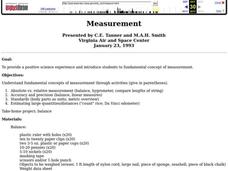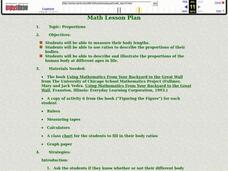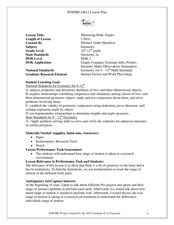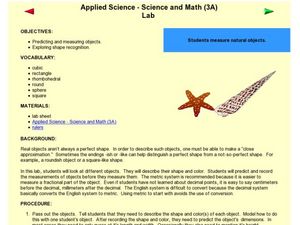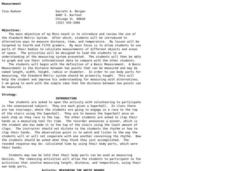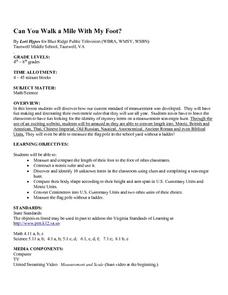Curated OER
Measurement
Students experience a positive science experiment and study fundamental concepts of measurement.
Baylor College
Body Strength
Your young learners will discover how muscular strength and endurance can increase with this truly hands-on activity! Beginning by writing an acrostic for the word strength, class members then engage in tracking their ability to squeeze...
Curated OER
Measurement, Perimeter and Area
Students explore the concept of measurement. In this measurement lesson, students collect data about themselves such as height, finger length, neck circumference, foot length, and other body measurements. Students cut squares...
Curated OER
All About Me
Third graders investigate the use of centimeters while measuring items with rulers which they construct. They examine the need for standard units of measure. They estimate the length of body parts before making the actual measurements.
Curated OER
Proportions
Students study proportions. In this mathematics lesson, students measure their body length, head length, and ratio of their body, write their findings on a group chart, and discuss how a person's head size or arm span are in proportion...
Curated OER
Are You a Golden Ratio?
Young scholars explore the concept of the golden ratio in nature and architectural design. They discuss examples such as petals on a sunflower and the Parthenon. In small groups they take turns measuring their body parts to find a...
Curated OER
Digestion - Part 3
Students explore the human body by reviewing the digestive system. In this human anatomy lesson, students identify the elements of human digestion by completing two body system worksheets. Students read the story What Happens to a...
Curated OER
Organ Systems: Excretory, Digestive, Immune, and Nervous
Eighth graders identify and describe the components of various body systems. They create vocabulary flash cards identifying the excretory, digestive, immune, and nervous systems and describing their functions. Students complete a...
Curated OER
Giant Mystery
Third graders determine the relationship between hand size and body size using centimeters as the unit of measure, They use the relationship to find the size of a hypothetical giant. They graph the measurements using a spreadsheet program.
Curated OER
"How Do You Measure Up?"
Fourth graders explore basic measurements by analyzing their own bodies. In this human anatomy lesson, 4th graders identify the units used to measure a human body such as centimeters, inches, ounces and pounds. Students complete a...
Curated OER
Measuring Body Angles
Young scholars use technology to graph and compare angles. In this geometry lesson, students range of motion in the environment. They identify the missing parts of polygons using similarity and congruence.
Curated OER
Measuring Natural Objects
Students predict the measurement of objects. In this measurement activity, students estimate the measurements of objects in a lab. Students measure irregular objects and generate scientific observations.
Curated OER
How Do I Measure Up?
Students measure and record weights and heights and compare to others in the class as they find out more about their bodies.
Curated OER
Measurement
Students study the metric system and examine other ways to measure. In this measurement lesson students complete activities that help them to better understand the measuring system.
Curated OER
Measuring with My Body
Third graders get into groups of two. Next, give each student a piece of butcher paper that is long enough for them to trace their entire body. One person lies down while their partner traces the outline of their body. Upon completion,...
Curated OER
Body Part Measurements
Second graders participate in a review of how to use rulers and yard sticks while collecting measurement information. They measure assigned body parts and chart the data on collection sheets. They make a spreadsheet with the information...
Curated OER
What a Square
Students examine the painting "Old Man With A Gold Chain" by Rembrandt. They identify geometric shapes in the painting, measure these shapes and compare the relationships of these measurements.
Curated OER
Where Does Food Go?
Students understand how their food moves through the digestive system. In this digestion lesson, students measure the length of the digestive system from a projection of it. Students draw their own pictures of the digestive system.
Curated OER
The Skeletal System
Young scholars research the skeletal system. In this anatomy lesson plan, students measure their bodies to find the approximate length of their bones. They draw and cut out each of the bones and then attach them using brads or glue.
Curated OER
Skeletal System
Seventh graders identify and label twenty-five bones of the skeletal system. In small groups they glue various types of dried pasta to a large human body outline. They attach the pasta to the outline and label the pasta bones.
Curated OER
What Happens When You Eat?
Learners explore digestion. In this Human Body lesson plan, students participate in six different activities pertaining to the Digestive System. Learners gain understanding of digestion through experimentation and investigation. Students...
Curated OER
FOOTSTEPS IN TIME
High schoolers measure and correlate their foot lengths and body heights, then use this data to estimate height of Laetoli hominids. They use metric measurement and graphing to determine these heights.
Curated OER
Proportions in Flight
Sixth graders calculate wingspan and the body length of the birds and understand how they relate to how the bird flies. In this wingspan lesson plan, 6th graders also calculate their own "wing span" with their arms.
Curated OER
Can You Walk a Mile With My Foot?
Students engage in a lesson plan that is concerned with the measurement of a foot as a customary unit. They take part in a series of activities to help them acquire skills of using a foot to compare other units of measurement. The...
